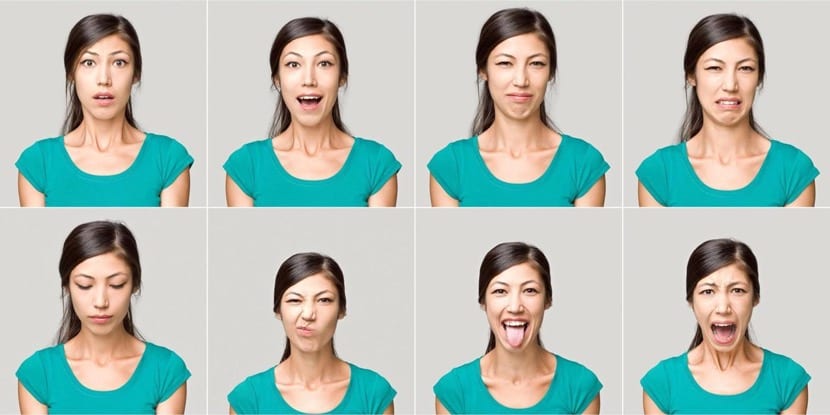
They say that the eyes are the mirror of the soul, and it is true, but the face also clearly shows what your emotions are at a given moment. Body language is the non-verbal cues that are used daily for communication. These non-verbal cues are essential for good everyday communication. From facial expressions to body movements, things that are not said ... all of this can convey a lot of information. The facial expressions will say much more than you think.
Body language accounts for 50-70% of all communications. Understanding body language is important, and it is also essential to pay attention to other signals, such as the context in which you find yourself. The language of easy expressions are just as important as the rest of the body, You want to know more? Do not lose detail!
Facial expressions
Have you ever thought about everything that a person can convey just with their facial expression? A smile can convey approval or happiness. When a person has a frown it can be a sign of disapproval or unhappiness. In some cases, facial expressions can also reveal the true feelings about a particular situation, even if they do not go according to the words ... Even if you say you feel good, your face can show the opposite.
Some examples that are examples of the emotions that are reflected with the face can be: happiness, sadness, anger, surprise, disgust, fear, confusion, contempt, desire, etc.
The expression on a person's face can even help determine if we trust or believe what the person is saying. One study found that the most reliable facial expression included a slight rise in the eyebrows and a slight smile. This expression, the researchers suggested, conveys friendliness and confidence.

Facial expressions are also among the most universal forms of body language. The expressions used to convey fear, anger, sadness and happiness are similar all over the world. Researcher Paul Ekman found a variety of facial expressions related to particular emotions including joy, anger, fear, surprise, and sadness. His research even suggests that we make judgments about people's intelligence based on their faces and expressions. One study found that people who had narrower faces and more prominent noses were more likely to be perceived as intelligent. People with smiling and cheerful expressions were also judged more intelligent than those with angry or serious expressions.
The eyes
As we said at the beginning of this article, the eyes are the mirror of the soul since they are capable of revealing much about what a person is feeling or thinking. When conversing with another person, paying attention to eye movements is a natural and important part of the communication process. Some common things you may notice include if people are making direct eye contact or looking away, how much they are blinking, or if their pupils are dilated. When evaluating body language, pay attention to the following eye cues:
- Look at the interlocutor. When a person looks directly into your eyes while conversing, this indicates that they are interested and paying attention. However, prolonged eye contact can make another person feel threatened or intimidated. On the other hand, breaking eye contact and looking away frequently can indicate that the person is distracted, uncomfortable, or trying to hide their real feelings.
- The flicker. Blinking is a natural thing that is needed to keep your eyes well lubricated. Attention should also be paid to whether a person is blinking too much or too little. People who blink the fastest do so when they feel distressed or uncomfortable. An infrequent blink can indicate that a person is intentionally trying to control their eye movements. For example, a poker player may blink less often because he is intentionally trying to appear unhappy about the hand he received.
- Pupil dilation. Pupil size can be a very subtle and involuntary nonverbal communication signal. While light levels in the environment control pupil dilation, emotions can sometimes cause small changes in pupil size as well. Widely dilated eyes, for example, can indicate that a person is interested or even excited when looking at another person.

Mouth
The mouth also says a lot about people and depending on their movements they can indicate one thing or another. Expressions and movements of the mouth can also be essential in reading body language. For example, biting the lower lip may indicate that the person is experiencing feelings of worry, fear, or insecurity.
Covering your mouth can be an effort to be polite if the person is yawning or coughing, but it can also be an attempt to cover up a disapproving gesture. Smiling is perhaps one of the best body language cues, but smiles can also be interpreted in many ways. A smile can be genuine, or it can be used to express false happiness, sarcasm, or even cynicism.

When evaluating body language, you should pay attention to the following signals from the mouth and lips to fully understand what the real meaning of the person is producing those signals. Remember that context must also be taken into account.
- Tighten your lips. Punching your lips can be an indicator of dislike, disgust, disapproval, or mistrust.
- Lip biting. People sometimes bite their lips because they are worried, anxious, or stressed.
- Cover your mouth. When people want to hide an emotional reaction, they can cover their mouths to avoid their smile or any other emotion that they do not want others to recognize.
- Slight changes in the mouth When there are slight changes in the mouth they can also be subtle indicators of what a person is feeling. When the mouth is slightly raised, it can mean that the person is feeling happy or optimistic. On the other hand, a slightly downward sloping mouth can be an indicator of sadness, disapproval, or even just a grimace.
At this point, do you know what the differences are between emotions and feelings?